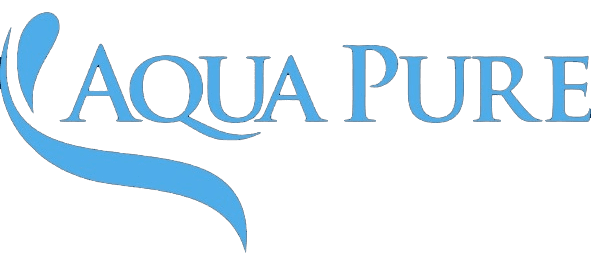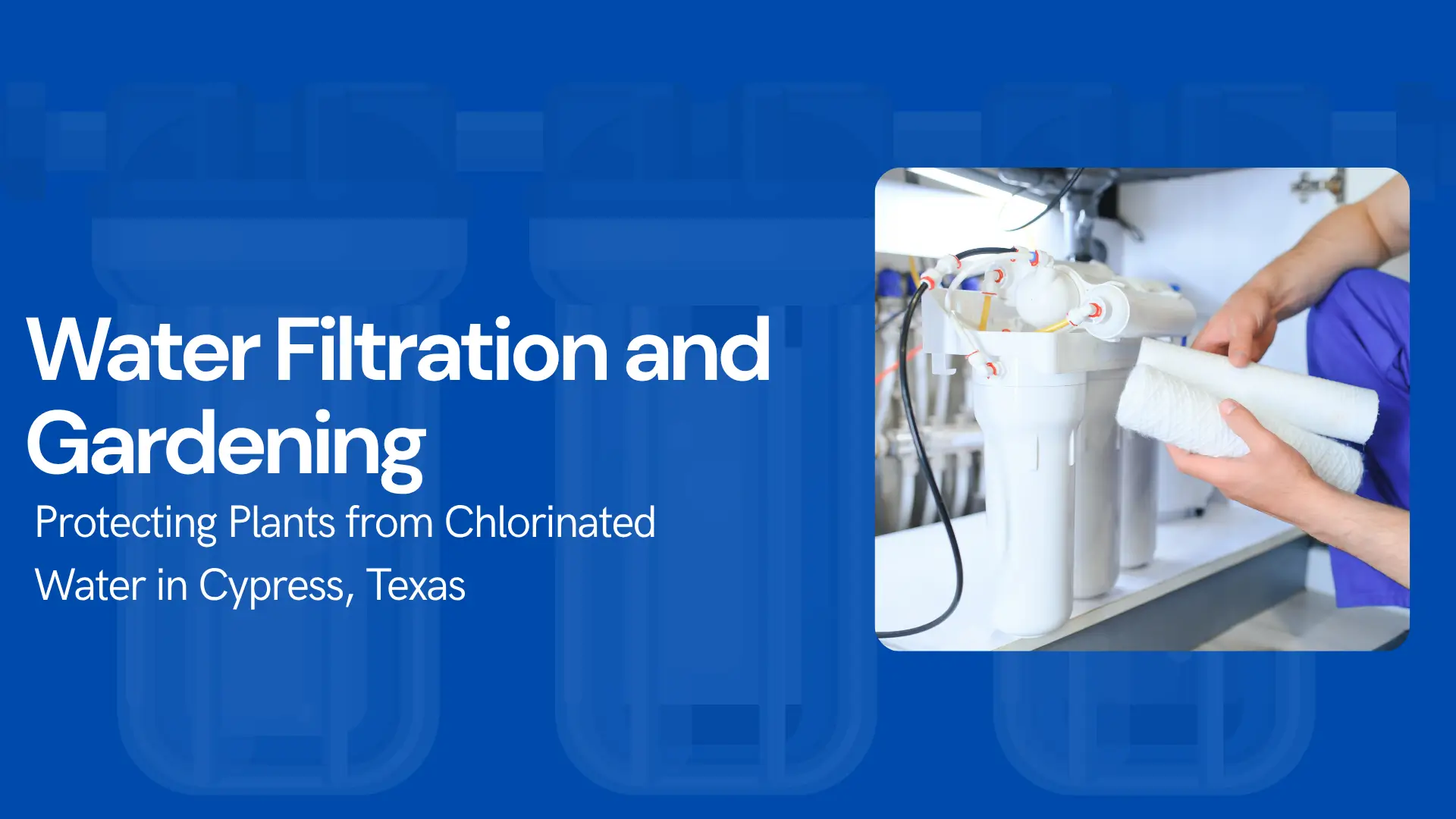The reality of local water in Cypress
Your water in Cypress is treated and meets required standardsbut meeting standards doesn’t mean it’s free of every factor that matters for plants, plumbing or appliances.
What your water is made of
In the area served by Harris County Fresh Water Supply District 61 (located in Cypress) your water is drawn from the Gulf Coast Aquifer, the Chicot & Evangeline aquifers. Because of this source, a few things to know:
- It’s moderately hard: You’ll find higher levels of calcium and magnesium minerals as water moves through rock. Hard water shows up in local reports.
- It’s disinfected: In larger systems like City of Houston (which serves much of the region) you’ll see chlorine residuals listed. In the 2022 report the chlorine (as disinfectant) had a maximum residual disinfectant level (MRDL) of 4.0 mg/L.
- There are detectable trace “by-products” and inorganic elements: For example, the Environmental Working Group database shows that for the Cypress Creek Utility District there were elevated levels of disinfection by-products like bromodichloromethane and chloroform.
- Acknowledged source-water susceptibility: The local water district notes that some of their sources are susceptible to certain contaminants.
Why this matters for your plants (and house)
- Hard water minerals: Elevated calcium and magnesium don’t usually pose health risks (to humans) in these amounts, but for plants they can leave residue on foliage and soil, cause clogging in irrigation lines, and for your plumbing/appliances lead to scale build-up (reducing efficiency and lifespan).
- Chlorine / disinfectants: Chlorine is added to protect drinking water from microbesbut it can also stress sensitive plants, especially seedlings, potted plants or irrigation systems with drip lines and emitters. It can reduce beneficial microbes in soil, and over time affect soil health and plant vitality.
- Disinfection by-products & trace organics: While concentrations are very low, these by-products can show up in local systems (as noted above). For plants the impact is less studied, but for overall indoor/outdoor environments it’s a reminder that “tap is safe for humans” isn’t the same as “perfect for gardens or specialized plant uses.”
- Sediment / turbidity / older plumbing: Though not always flagged as “dangerous,” localized older homes may have more sediment, rust or pipe-scale deposit issues which can affect water clarity, block emitters or add unwanted iron or manganese to soil.
How to spot trouble early in your gardening system
You don’t necessarily need a lab to see signs something is off. Here are practical signals to watch for in Cypress.
- White or gray crust around faucets, watering cans, or drip emitters: That’s mineral scale from hard water.
- Slow-dripping or blocked drip lines / emitters: If your irrigation system is suddenly sluggish, scale or particulate matter may be building up.
- Thin-leafed or yellowing plants, especially pots or raised beds: This can indicate root stress from chlorine or poor soil biology (chlorine kills beneficial microbes) or mineral imbalance.
- Water puddling on the surface, then quickly running off: Could be compacted soil from mineral salt buildup, especially in containers.
- Odor or taste in tap water: While the water supply reports show compliance, you may detect a “chlorine smell” when first drawing water. That smells harmless to humans (within limits) but could impact sensitive plants.
- Appliances/fixtures showing scale: While this is more about your home, if your dishwasher, kettle or hot-water heater are showing scale then your water is depositing mineralsyour irrigation system is likely doing the same.
Tailored solutions for home gardeners in Cypress
Since you’re focused on keeping plants happy, here are friend-to-neighbor, expert-backed steps you can take.
Test your water
- Grab a basic water hardness test kit (the kind that measures total hardness in ppm or grains per gallon).
- If you suspect high chlorine, measure right after the tap and then again after 30 minutes of standingchlorine should drop; if it doesn’t, consider point-of-use filtration.
- For more detailed lookespecially if you’re investing heavily into a garden or irrigation systemhire a certified technician or use a lab to check for TDS (total dissolved solids), iron, manganese, chlorine residuals, and even trace organics.
- If you live in Cypress and your water is from one of the local districts mentioned above you can download their “consumer confidence reports” to get baseline levels.
Decide on filtration and/or water softening (but with the gardener’s lens)
- Water softener: If your water hardness test shows very high levels (e.g., over 10–12 grains per gallon / 170–200 ppm) then a whole-house water softener helps your plumbing and irrigation lines stay clear. It also reduces mineral load in the water used for plants. Your plants still need some mineralsbut you can always reintroduce healthy soil amendments rather than deal with scale.
For residents in this area the team at Aquapure offers water softener installation with free installation and support by certified technicians, easy financing including $0 down payment and a lifetime warranty for peace of mind. They’re Texas-owned and family-operated with over 10 years of local experience and they customise every system for the home’s needs. - Water filtration / point-of-use or whole-house: If chlorine, disinfection by-products or sediment are a concern, consider a whole-house filter (so all water coming in is treated) or at minimum a dedicated irrigation line filter. Aquapure provide custom home water-filtration systems with free installation too (see their home water filter system installation link) and make it easy to add whether your priority is drinking water or irrigation.
For your garden watering I recommend a filtration step that removes chlorine and large particles before the water enters drip lines or hoses. This helps protect soil microbes and plant roots. - Dedicated irrigation line: If you have an expensive or sensitive garden (containers, hydroponics, high-value plants) you could run a separate line that uses filtered or softened water, so your indoor plumbing stays as is but your garden gets “better” water.
- Manual buffer: For small gardens, simply filling watering cans and letting water sit for 24 hours in an open container can reduce chlorine. Using mulch and organic matter will buffer mineral stress too.
Adjust your irrigation and soil practices
- Consider adding organic matter (compost) and mulch so that plants rely less on the incoming water for buffering.
- Flush containers periodically: Hard-water minerals will build up in pots, so once a season flush with fresh rainwater or filtered water if you can.
- Monitor emitter output: If drip lines are getting blocked, unscrew the head, check for mineral deposits, soak in vinegar if needed.
- Test soil pH: Hard water often raises soil pH slightly over time. Many garden plants prefer slightly acidic to neutral (6.0-7.0). If your soil is drifting higher you may need acidifying amendments (e.g., pine bark fines, sulfur) or switch to plants more tolerant of alkaline conditions.
- Consider timing of watering: Early morning is best, lets water sink in before heat stresses the plants. If chlorine is present, letting water sit for a little before use helps.
Garden-specific benefits when you improve your water quality
- Healthier root zones: Less chlorine = more beneficial microbes = stronger roots and more consistent nutrient uptake.
- Clearer irrigation lines: With fewer mineral deposits tubes and emitters last longer, you avoid blockages and loss of efficiency.
- Better foliar condition: If you use overhead watering, less mineral buildup means leaves stay cleaner, photosynthesis stays more efficient.
- Longevity of plumbing fixtures that service your garden: Connecting hoses, pumps, valves see less wear from high mineral load.
- Opportunity for premium plants: If you’re growing higher-value plants (orchids, show specimens, rare veg) the difference in water quality matters more.
A gardener’s quick checklist for Cypress home use
- Test your water hardness and chlorine residual.
- Check emitter flow or hose output for clarity and speed.
- Inspect plant leaves and soil surface for deposits or crusting.
- Flush irrigation lines annually if you see scale.
- If hardness > 200 ppm or mineral build-up is visible, consider a water softener.
- If you detect chlorine smell or plant stress, consider an irrigation-specific filter or using gallon-method water (sit time or rainwater).
- Add organic mulch and compost to help buffer water fluctuations.
- Label a tap or hose for “plant use” to keep filtered/softened water separate from regular home tap water (optional but useful).
- If upgrading water system for your whole house, make sure the provider offers service agreements, certified technicians, free installation and a lifetime warranty (as Aquapure does).
- Review local district’s annual water quality report to stay aware of any changes in source or treatment. For example, District 61 says they’ve never violated a standard and are certified as a “Superior Water System” by the Texas Commission on Environmental Quality.
Local FAQ
Q 1: Is Cypress tap water safe for my plants if I don’t filter or soften it?
A Yeswith a caveat. The water served is safe under federal and state guidelines, and many homeowners water gardens without issues. But “safe” for drinking isn’t the same as “ideal” for plants, especially sensitive or high-value ones. Hard water minerals and chlorine can gradually affect plant health, especially in containers or with drip irrigation.
Q 2: Do I need a water softener in Cypress just for gardening?
Not necessarily. If your hardness is moderate (e.g., under ~150 ppm or ~9 grains per gallon) and you’re watering in the garden directly to soil, you may be fine. But if you have tell-tale signs (scale, blockages, sensitive plants) then a softener becomes more valuable.
Q 3: How much does the upgraded filtration/softening cost in Cypress?
Costs vary by home size, water volume and system tier. A good rule of thumb is to plan for a whole-house softener plus filter system in the low-to-mid-thousands (USD) installed. Many local providers offer financing with $0 down payment and payment terms spread out (as Aquapure offers) which helps make the decision easier.
Q 4: Are there any contaminants in Cypress water I should worry about specifically?
While your system shows compliance, reviews of local utility data (e.g., EWG for the Cypress Creek Utility District) do show trace levels of disinfection by-products and arsenic above ultra-stringent “guideline” levels (though still within legal limits). For gardening purposes the most relevant are chlorine/disinfectants and hardness/minerals more than the ultra-trace elements.
Q 5: If I only care about my irrigation line (garden) and not the whole house, is that an option?
Absolutely. Many smart gardeners route a separate irrigation tap through a filter or softener so the “house” side stays standard and the “garden” side gets enhanced water. This is cost-efficient and lowers risk for your plants while avoiding unnecessary expense for the whole house.
Final friendly takeaway
Your garden in Cypress has an excellent shot at thriving. The municipal water system is doing its job; your neighbourhood is well-served. But because you love plants (and I do too) you know that giving them just “okay” water is not the same as giving them “great” water. By testing your tap, watching for those early signs (scale, block drip lines, stressed plants), and considering targeted filtration or softening for your garden, you’ll be investing smartly in plant health, garden longevity and lower maintenance.
If you’d like a tailored recommendation for your homehow hard your water is, whether a filter or softener makes sense for just your garden or house-wide, and a free professional water test from a local teamI can help you set that up. It’s always wise to have that “trusted neighbour” technician come take a quick look, especially since your irrigation and plant investments deserve care.



